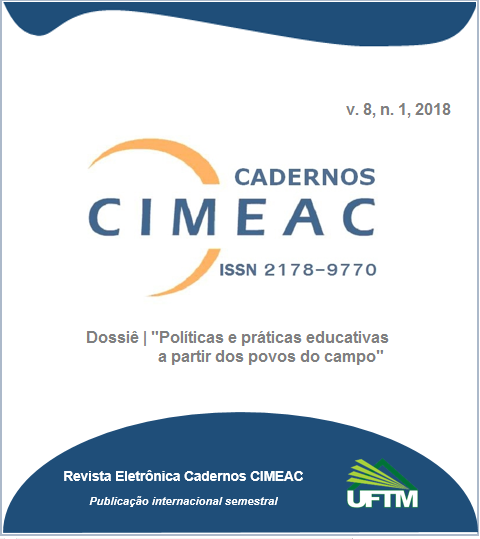“Nós sem Deus e sem água não é nada”: saberes e conquista na criação da reserva de desenvolvimento sustentável Nascentes Geraizeiras / "Without god and without water we ain't nothing": knowledge and conquest in creating...
DOI:
https://doi.org/10.18554/cimeac.v8i1.2773Resumo
Desde o início da década de 1970, as disputas por território na região Norte de Minas Gerais cresceram em consequência do “encurralamento” das comunidades rurais, da crise hídrica e assoreamento de solos provocados pelas ocupações desordenadas dos empreendimentos da monocultura do eucalipto. Recentemente, criou-se uma unidade de conservação de uso sustentável em área de cerrado na região com o objetivo de proteger a biodiversidade e as nascentes que ainda restam. O presente trabalho procurou compreender de que modo os diversos saberes (científicos, tradicionais, religiosos, dos movimentos sociais, dentre outros) foram mobilizados, na comunidade de Água Boa II, no processo de criação da reserva de desenvolvimento sustentável Nascentes Geraizeiras. Realizou-se trabalho de campo por meio de visitas e entrevistas semiestruturadas a moradores da comunidade mencionada. As informações obtidas nos indicam que os camponeses envolvidos na luta pela criação da reserva de desenvolvimento sustentável possuem um modo próprio e singular de relacionar-se com a natureza, através de saberes que entrelaçam diferentes conhecimentos, especialmente aqueles ligados aos conceitos de território, comunidade, religiosidade e biodiversidade.
Palavras-chave: Reserva de desenvolvimento sustentável; Conhecimentos tradicionais; Saberes; Geraizeiros; Biodiversidade.
ABSTRACT: Since the beginning of the 1970’s, disputes over territory in the northern region of Minas Gerais increased, as a consequence of the cornering of rural communities, of the hydric crisis and of the silting of soils caused by disordered occupations of eucalyptus monoculture enterprises. Recently, a unit of conservation for sustainable use in an area of Brazilian cerrado in the region, with the objective of protecting a biodiversity and water resources that still remain, was created. The present work sought to understand how the diverse knowledge (scientific, traditional, religious, social movements, among others) were mobilized in the community of Água Boa II in the process of creating the sustainable development reserve Nascentes Geraizeiras. Fieldwork was carried out through visits and semi-structured interviews with residents of the mentioned community. The information obtained indicates that the peasants involved in the struggle to create the sustainable development reserve have a unique way of relating to nature, through knowledge that interweaves different wisdoms, especially those related to concepts of territory, community, religiosity and biodiversity.
Keywords: Sustainable development reserve; Traditional knowledge; Knowledge; Geraizeiros; Biodiversity.
Downloads
Publicado
Edição
Seção
Licença
Os autores que publicam nesta revista concordam com os seguintes termos:
(a) Não cobramos dos autores para a publicação neste periódico.
(b) Autores mantém os direitos autorais e concedem à revista o direito de primeira publicação, com o trabalho simultaneamente licenciado sob a Licença Creative Commons que permite o compartilhamento do trabalho com reconhecimento da autoria e publicação inicial nesta revista.
(c) Autores têm permissão e são estimulados a difundir e a distribuir a versão publicada de seu trabalho online (ex.: em repositórios institucionais ou na sua página pessoal) após o processo editorial, já que isso pode aumentar o impacto e a citação do trabalho publicado (Veja O Efeito do Acesso Livre).
* * *
AUTHORS COPYRIGHT AND PUBLISHING RIGHTS
Authors who publish with this journal agree to the following terms:
(a) This journal does not charge authors for publication.
(b) Authors retain copyright and grant the journal right of first publication with the work simultaneously licensed under a Creative Commons Attribution License that allows others to share the work with an acknowledgement of the work's authorship and initial publication in this journal.
(c) For authors whose articles have been accepted: authors are permitted and encouraged to post their work online (e.g., in institutional repositories or on their website) after the publication of the text in Cadernos CIMEAC, as it can lead to productive exchanges as well as earlier and greater citation of published work (See The Effect of Open Access).


 10.18554/cimeac
10.18554/cimeac


